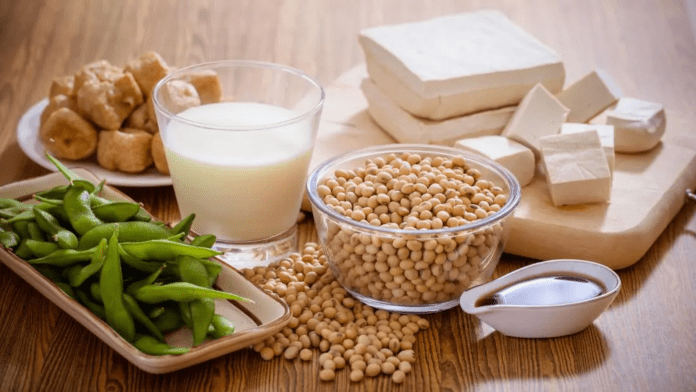Women’s hormonal health plays a crucial role in their overall well-being, affecting various aspects of their lives, from reproductive health to mood regulation. Phytoestrogens, naturally occurring compounds found in certain plant-based foods, have been gaining attention for their potential to positively influence women’s hormonal balance. This article explores the impact of phytoestrogen-rich foods on women’s hormonal health, shedding light on the revolutionary potential of these compounds.
Understanding Phytoestrogens:
Phytoestrogens are a diverse group of plant compounds that share a structural resemblance to estrogen, the primary female sex hormone. Due to this structural similarity, phytoestrogens can interact with estrogen receptors in the human body, modulating the hormonal response. There are several types of phytoestrogens, including isoflavones, lignans, and coumestans, found in various plant-based sources such as soybeans, flaxseeds, lentils, and red clover.
Hormonal Imbalance in Women:
Hormonal imbalance is a common concern for women of all ages. It can manifest as irregular menstrual cycles, mood swings, weight gain, and other uncomfortable symptoms. Furthermore, hormonal fluctuations during menopause can lead to hot flashes, night sweats, and decreased bone density. Hormone replacement therapy (HRT) has traditionally been used to alleviate these symptoms, but it is associated with potential risks and side effects. As a result, many women are now turning to phytoestrogen-rich foods as a natural and safer alternative.
Balancing Hormones with Phytoestrogens:
1. Menstrual Health:
Phytoestrogens have shown promise in promoting regular menstrual cycles. The isoflavones in soy and red clover, for instance, have been associated with a positive impact on estrogen levels in women, potentially aiding in maintaining menstrual regularity. Consuming phytoestrogen-rich foods may be particularly beneficial for women with irregular periods or those experiencing premenstrual syndrome (PMS) symptoms.
2. Menopause Relief:
During menopause, estrogen levels decline, leading to various discomforts. The weak estrogenic activity of phytoestrogens can help alleviate some menopausal symptoms, such as hot flashes and night sweats. Additionally, phytoestrogens may contribute to maintaining bone health, reducing the risk of osteoporosis, which is common among menopausal women.
3. Breast Health:
Phytoestrogens may play a protective role in breast health by competing with the body’s own estrogen for receptor binding. This competition may reduce the overall estrogenic effect and potentially lower the risk of estrogen-dependent breast diseases.
4. Cardiovascular Health:
Estrogen has a protective effect on the cardiovascular system, and phytoestrogens’ mild estrogenic activity may contribute to heart health. Studies suggest that diets rich in phytoestrogens may help reduce cholesterol levels and blood pressure, lowering the risk of heart disease in women.
5. Cognitive Function:
Emerging research indicates that phytoestrogens might positively impact cognitive function and memory. The estrogen-like effects of these compounds may help protect brain cells and reduce the risk of age-related cognitive decline.
6. Bone Density:
Phytoestrogens’ potential to mimic estrogen’s actions may support bone health, which is especially crucial for women at risk of osteoporosis, particularly during and after menopause.
7. Breast Cancer Risk:
The role of phytoestrogens in breast cancer prevention remains a topic of ongoing research. Some studies suggest that phytoestrogens’ presence in the diet may reduce breast cancer risk, while others highlight potential complexities in their effects.
Incorporating Phytoestrogen-Rich Foods into the Diet:
To reap the benefits of phytoestrogens, women can incorporate certain foods into their diet:
1. Soy Products: Soybeans, tofu, tempeh, and soy milk are excellent sources of isoflavones, making them valuable additions to a hormone-balancing diet.
2. Flaxseeds: Rich in lignans, flaxseeds can be sprinkled on salads, yogurt, or incorporated into smoothies.
3. Lentils and Chickpeas: These legumes contain beneficial phytoestrogens, along with a wealth of other nutrients.
4. Red Clover: Available in supplement form or as tea, red clover contains various isoflavones.
5. Berries: Certain berries, such as raspberries and strawberries, also contain phytoestrogens, adding a delicious option to the diet.
6. Whole Grains: Foods like oats and barley contain lignans, further contributing to hormonal health.
Caution and Individual Variations:
While phytoestrogens have shown promise in positively impacting women’s hormonal health, it is essential to approach their consumption with caution and consideration for individual variations. Some women may experience sensitivities or allergies to certain phytoestrogens, leading to adverse reactions. Additionally, women with existing hormonal conditions or those taking medications should consult a healthcare professional before making significant changes to their diet.
Final Thoughts:
The revolution in women’s hormonal health through phytoestrogen-rich foods holds immense promise. As an alternative or complementary approach to traditional hormone replacement therapies, these plant-based compounds offer numerous potential benefits, ranging from menstrual health to menopause relief, cardiovascular support, and bone density preservation. However, further research is needed to fully understand the complexities of phytoestrogens and their effects on individual health. In the meantime, women can explore incorporating these nutrient-rich foods into their diet to harness the power of phytoestrogens and promote their overall hormonal well-being.





